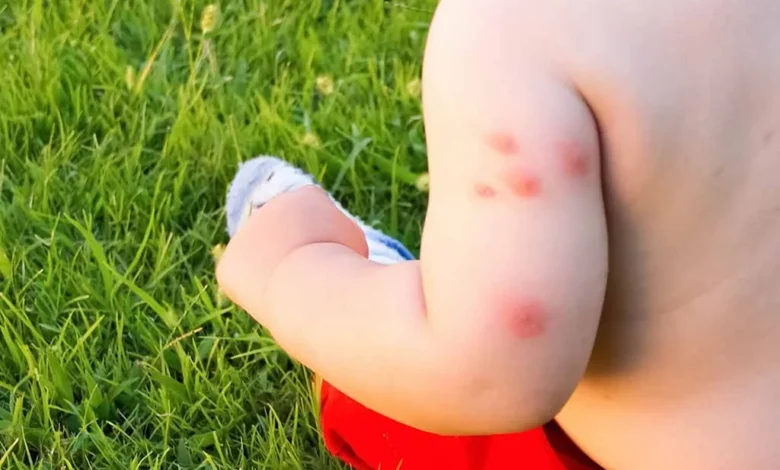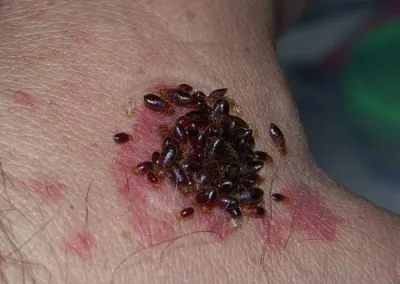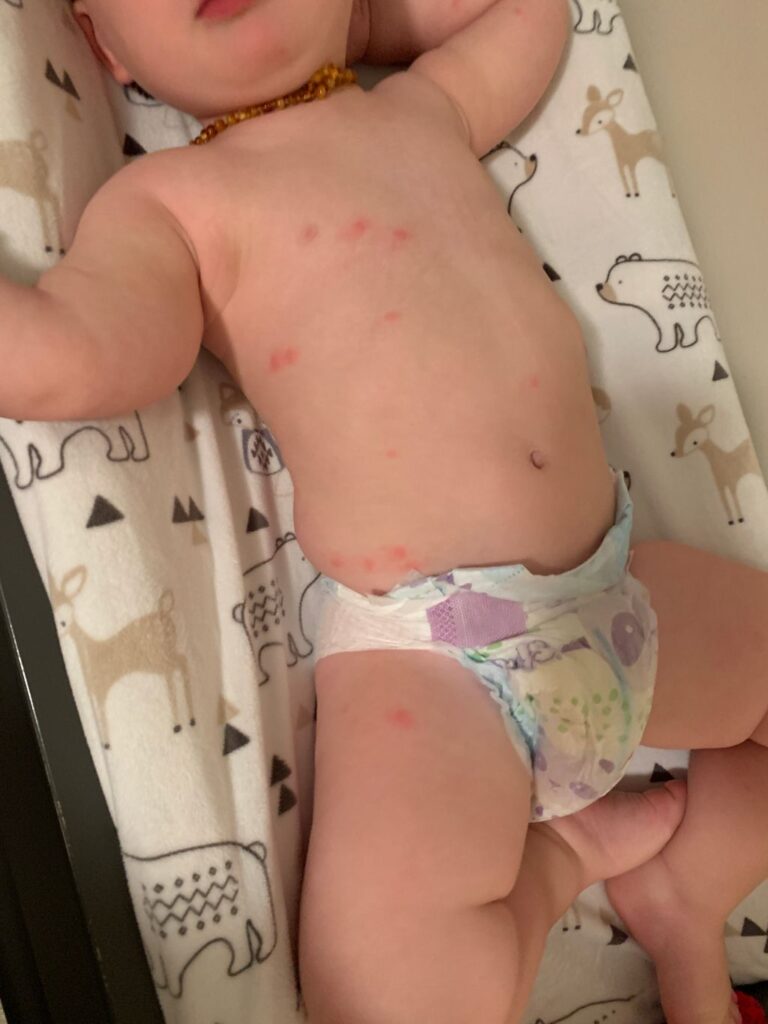Understanding Baby Bed Bug Bites: What Parents Need to Know

Introduction:
Bed bugs are notorious for causing problems in households, especially when it comes to the younger members of the family. Parents often worry about bed bug bites on their babies and what these bites could mean for their child’s health and comfort. In this article, we will dive into everything you need to know about baby bed bug bites, including how to identify them, how to prevent them, how to treat them, and more. Whether you’re a new parent or a seasoned pro, understanding bed bug bites in babies is essential for maintaining their well-being.
What Are Bed Bugs and How Do They Affect Babies?

Bed bugs are small, reddish-brown insects that feed on the blood of humans and animals. These pests are typically active at night and are drawn baby bed bug bites to warmth and the carbon dioxide exhaled by humans. While bed bugs don’t carry diseases, their bites can cause irritation and discomfort. Babies, with their sensitive skin, can be more susceptible to the effects of bed bug bites.
How Bed Bugs Bite:
Bed bugs feed on their host by piercing the skin with their elongated mouthparts and drawing blood. The bites usually occur while the person is asleep, as the baby bed bug bites is nocturnal. The bites are often painless at first but can result in itching and swelling once the area is irritated. For babies, who have thinner skin and a less developed immune system, these bites can be more noticeable and cause additional discomfort.
Why Babies Are More Vulnerable:
Babies and young children are more vulnerable to bed bug bites because their skin is thinner and more sensitive than that of adults. Additionally, babies tend to baby bed bug bites sleep more soundly and in one position for longer periods, making them easy targets for bed bugs. The bites themselves can cause itching, redness, and in some cases, more severe reactions like swelling or infection, especially if the bite is scratched excessively.
Identifying Bed Bug Bites on Babies
Spotting bed bug bites on babies can be tricky. Since babies can’t express where they feel discomfort, parents must be vigilant for signs of irritation. Recognizing baby bed bug bites the characteristic appearance of bed bug bites will help you address the problem early and effectively.
Appearance of Bed Bug Bites:
Bed bug bites on babies often appear as small, red welts or bumps. They may be in a straight line or clustered together, which is a distinguishing feature of bed bug bites compared to other insect bites. The bites might also show a darker spot in the center where the baby bed bug bites bug’s saliva has caused a reaction. While the bites might initially seem harmless, they can cause a great deal of discomfort for babies due to the sensitivity of their skin.
Common Signs of Bed Bug Infestation:
Apart from the bites themselves, there are other signs you can look for that indicate a bed bug infestation. These include small blood stains on your baby’s bedding, dark spots of bed bug excrement on sheets or mattresses, and the presence of the bugs themselves, which are baby bed bug bites typically found in the seams of mattresses, cracks in walls, or behind furniture.
Differentiating Bed Bug Bites from Other Insect Bites:

It’s important to differentiate bed bug bites from those of other insects like mosquitoes or fleas. Bed bug bites are usually smaller, tend to occur in a line or group, and may cause more severe itching. Unlike flea or mosquito bites, which may appear as isolated red bumps, bed bug bites baby bed bug bites often show up in clusters and have a distinctive pattern that can help identify them.
Common Symptoms of Baby Bed Bug Bites
When a baby gets bitten by a bed bug, several symptoms can occur, ranging from mild irritation to more severe reactions. Understanding these symptoms is important for taking the baby bed bug bites right steps to treat the bites and ensure your baby’s comfort.
Mild to Moderate Symptoms:
Most bed bug bites result in mild to moderate symptoms, which can include redness, swelling, and itching. These symptoms can be irritating for babies, and since they are unable to baby bed bug bites scratch effectively, they may become distressed. The itching can lead to restlessness and trouble sleeping, which may affect both you and your baby’s quality of life.
Severe Reactions:
In some cases, babies may experience more severe reactions to bed bug bites. This can include larger areas of swelling, a more intense rash, or even hives. Babies with allergic reactions to bed bug saliva may develop more noticeable symptoms, such as intense redness, heat, or blistering baby bed bug bites at the site of the bite. Although rare, infections can occur if the bite is scratched too much and bacteria enters the wound.
Long-Term Symptoms:
For most babies, the symptoms of bed bug bites are temporary and resolve within a few days. However, in rare cases, a more serious allergic reaction or infection may develop, leading to baby bed bug bites long-term effects such as scarring. It’s essential to monitor your baby closely for any signs of infection, such as pus, increased redness, or warmth around the bite.
How to Treat Baby Bed Bug Bites
Treating bed bug bites on babies requires careful attention to ensure their comfort and avoid further irritation. Here are some methods to treat and alleviate the symptoms associated with bed bug bites.
Calming the Itching:
To soothe the itching caused by bed bug bites, you can use a mild, fragrance-free lotion or cream containing hydrocortisone. Over-the-counter hydrocortisone creams are generally baby bed bug bites safe for babies over the age of six months, but always check with your pediatrician before using any new products. For babies under six months, you may want to try a natural remedy, like coconut oil, which can be effective in moisturizing the skin and reducing inflammation.
Preventing Infection:
If your baby scratches the bites, they may break the skin and open the door for infection. To prevent this, keep the affected area clean and dry. Gently wash the bites with soap and water, and apply a soothing ointment to reduce irritation. If there are signs of infection, such as excessive baby bed bug bites redness, warmth, or pus, consult your pediatrician for advice on further treatment, such as antibiotics.
Natural Remedies for Relief:
Some parents prefer using natural remedies to soothe their baby’s bed bug bites. Aloe vera, for instance, has anti-inflammatory properties that can help calm irritation and redness. Chamomile tea, when cooled and applied to the skin, can also provide relief. However, always patch-test any natural remedy on a small area of your baby’s skin before using it more widely to ensure there is no allergic reaction.
Preventing Bed Bug Bites in Babies
The best way to keep your baby safe from bed bug bites is to prevent an infestation from happening in the first place. Prevention is key, and there are several strategies you can use to minimize the risk of your baby getting bitten by bed bugs.
Inspecting and Cleaning Bedding:
Regularly inspect your baby’s bedding, including sheets, mattresses, and pillows, for any signs of bed bugs. Wash all bedding in hot water at least once a week, as high temperatures can kill bed bugs and their eggs. If you find any signs of bed bugs, take immediate action to treat the infestation.
Sealing Cracks and Gaps:
Bed bugs like to hide in cracks and crevices in walls, furniture, and floors. To prevent them from entering your baby’s room, seal any visible cracks or gaps in the walls or around windows and doors. This will help minimize the chances of bed bugs entering your home and finding their way into your baby’s sleeping area.
Using Bed Bug Protectors:
Invest in bed bug-proof mattress and pillow encasements. These encasements create a barrier that prevents bed bugs from hiding inside the mattress and will make it easier to spot them if they’re present. Regularly vacuum around your baby’s bed and the surrounding area to reduce the chance of a hidden infestation.
Dealing with a Bed Bug Infestation: What to Do If Your Baby Is Bitten
If you find yourself dealing with a bed bug infestation in your home, it’s crucial to address the issue quickly to prevent further bites. Here’s what you should do if you suspect a bed bug problem.
Step 1: Confirm the Infestation
The first step in dealing with a bed bug infestation is to confirm that bed bugs are the cause of your baby’s bites. Check for signs such as blood stains on sheets, black dots on the mattress, or the bugs themselves. If you’re unsure, consider hiring a pest control expert to conduct a thorough inspection.
Step 2: Take Immediate Action
Once you’ve confirmed the presence of bed bugs, take immediate action to get rid of them. This may include washing all bedding, using bed bug sprays or powders, and calling in a professional exterminator. In cases of severe infestation, professional pest control services may be necessary to ensure complete eradication.
Step 3: Monitor Your Baby’s Health
As you work to eliminate the bed bugs, continue to monitor your baby’s health. Keep an eye on the bites and any changes in your baby’s symptoms. If the bites worsen or if your baby develops an allergic reaction, seek medical attention promptly.
Conclusion
Baby bed bug bites can be a source of concern for many parents, but understanding how to identify, treat, and prevent them can make a big difference in how you manage the situation. While these bites can be uncomfortable for babies, they are usually not serious, and with the right steps, you can help your little one recover quickly. By taking proactive measures to prevent bed bugs and being vigilant about your baby’s health, you can ensure that your home remains a safe and comfortable space for your child to sleep peacefully.



